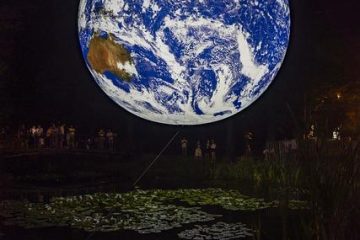Nestled within the vast expanse of cosmic mysteries lies a theory as enchanting as it is profound – the Gaia Theory of Earth. This captivating hypothesis transcends traditional scientific boundaries, offering a unique perspective on our planet as a dynamically interconnected and self-regulating organism. Join us on a journey through the intricate web of life, where Earth reveals itself as more than just a lifeless rock spinning through space. Embrace the awe-inspiring complexity of Gaia Theory and unravel the secrets hidden within the very fabric of our existence.
Table of Contents
- Exploring the Gaia Theory of Earth: Unveiling the Interconnectedness of Life
- The Role of Feedback Mechanisms in Gaia Theory: A Delicate Balance
- Implications of Gaia Theory on Environmental Conservation Efforts
- Embracing Gaia Theory: Practical Steps Towards Sustainable Living
- Q&A
- In Retrospect

Exploring the Gaia Theory of Earth: Unveiling the Interconnectedness of Life
Unlocking the mysteries of our planet’s intricate web of life, the Gaia Theory proposes a mesmerizing concept that Earth is a living organism in itself. This groundbreaking theory suggests that all organisms, from the tiniest bacteria to the mightiest redwoods, are interconnected and function as parts of a single, self-regulating system.
At the core of the Gaia Theory lies the idea that the Earth’s biosphere, atmosphere, hydrosphere, and geosphere are all intertwined and work together to maintain optimal conditions for life to thrive. By recognizing this interdependence, we can gain a deeper appreciation for the delicate balance that sustains life on our precious planet.
The Role of Feedback Mechanisms in Gaia Theory: A Delicate Balance
Feedback mechanisms play a crucial role in maintaining the delicate balance of Gaia Theory, ensuring harmony and sustainability within our planet. These intricate systems act as nature’s checks and balances, regulating various processes to keep Earth’s ecosystems in equilibrium. From temperature control to nutrient cycles, feedback mechanisms work tirelessly to uphold Gaia’s intricate web of life.
One key aspect of these mechanisms is their interconnected nature, where a change in one element triggers a cascade of effects throughout the system. Through positive and negative feedback loops, Gaia self-regulates, adapting to external pressures and internal shifts. Understanding and respecting these feedback mechanisms is vital for humans to coexist harmoniously with Earth, fostering a mutual relationship of balance and mutual benefit.

Implications of Gaia Theory on Environmental Conservation Efforts
As we delve into the depths of the Gaia Theory, a profound connection between all living organisms and the Earth itself begins to unveil. This theory proposes that the Earth functions as a self-regulating organism, where living beings and the environment are intertwined in a delicate balance. Understanding this interconnectedness sheds light on how human actions can have far-reaching effects on our planet’s well-being.
<p>By embracing the principles of the Gaia Theory, we are prompted to rethink our approach to environmental conservation. It underscores the importance of preserving biodiversity, reducing pollution, and promoting sustainable practices. Recognizing that every action we take has a ripple effect on the Earth as a whole empowers us to make conscious choices that contribute to the harmony and health of our planet.</p>
Embracing Gaia Theory: Practical Steps Towards Sustainable Living
Embracing the principles of Gaia Theory can lead us towards a more sustainable and harmonious relationship with the Earth. By implementing practical steps in our daily lives, we can contribute to the well-being of our planet and create a more balanced ecosystem for future generations.
- Connect with Nature: Spend time outdoors, observe the beauty of the natural world, and appreciate the interconnectedness of all living beings.
- Reduce Waste: Minimize single-use plastics, recycle, compost, and opt for reusable products to lessen our environmental impact.
- Educate Yourself: Learn about environmental issues, climate change, and sustainable practices to make informed choices that benefit the Earth.
Moreover, supporting local farmers, choosing organic and ethically sourced products, and advocating for environmental policies can further advance the principles of Gaia Theory. Small changes in our lifestyle can ripple outwards, creating a positive impact on the planet and fostering a sense of responsibility towards Mother Earth.
- Practice Mindfulness: Cultivate gratitude for the Earth’s resources and approach consumption with awareness and intention.
- Plant Trees: Contribute to reforestation efforts, participate in tree-planting initiatives, and help restore natural habitats for biodiversity preservation.
- Engage in Community: Join local environmental groups, volunteer for eco-friendly projects, and inspire others to embrace sustainable living practices.
Q&A
**Q: What is the Gaia Theory of Earth?**
A: The Gaia Theory of Earth is a captivating concept that views the Earth as a living, self-regulating organism, named after the Greek goddess of the Earth, Gaia.
Q: How does the Gaia Theory propose that Earth functions as a living organism?
A: According to the Gaia Theory, Earth maintains and regulates conditions necessary for life, similar to how a living organism maintains homeostasis for optimal functioning.
Q: Who developed the Gaia Theory of Earth?
A: The Gaia Theory was proposed by scientist James Lovelock and microbiologist Lynn Margulis in the 1970s, revolutionizing the way we perceive our planet.
Q: What are some key principles of the Gaia Theory of Earth?
A: Key principles of the Gaia Theory include the idea that the Earth’s atmosphere, oceans, and land interact as a complex system to maintain conditions suitable for life.
Q: How does the Gaia Theory impact our understanding of environmental conservation?
A: The Gaia Theory emphasizes the interconnectedness of all living and non-living components of Earth, highlighting the importance of environmental stewardship and sustainable practices.
Q: What criticisms or controversies surround the Gaia Theory of Earth?
A: Some critics argue that attributing characteristics of a living organism to Earth anthropomorphizes the planet, while others debate the extent to which Earth can be considered truly self-regulating.
Q: How does the Gaia Theory of Earth influence scientific research and environmental policy-making?
A: The Gaia Theory encourages a holistic approach to understanding Earth’s ecosystems, influencing ecological research and inspiring discussions on how to best protect our planet for future generations.
In Retrospect
As we delve into the intricate web of the Gaia Theory of Earth, we are humbled by the interconnectedness of our planet’s systems. From the gentle whisper of the wind to the roaring of the oceans, Gaia’s symphony reminds us of the delicate balance that sustains all life. Let us continue to cherish and protect this precious blue-green jewel we call home, for in nurturing Gaia, we ultimately nurture ourselves. Embrace the wisdom of Gaia, and may our journey towards harmony with nature be a harmonious one.



0 Comments